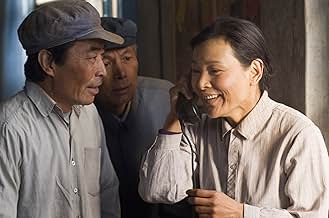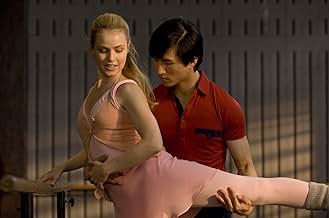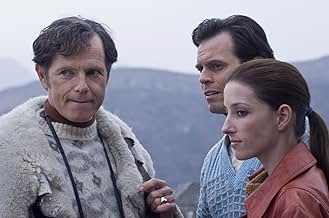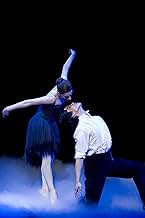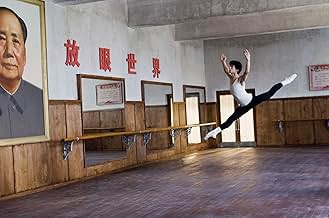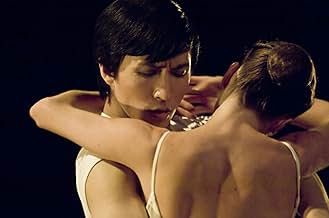NOTE IMDb
7,3/10
8,5 k
MA NOTE
Ajouter une intrigue dans votre langueIn Maoist China, a boy is taken from his family and trained to become a dancer, but everything he knows is challenged when he is chosen to attend a ballet summer school in Houston, Texas.In Maoist China, a boy is taken from his family and trained to become a dancer, but everything he knows is challenged when he is chosen to attend a ballet summer school in Houston, Texas.In Maoist China, a boy is taken from his family and trained to become a dancer, but everything he knows is challenged when he is chosen to attend a ballet summer school in Houston, Texas.
- Réalisation
- Scénario
- Casting principal
- Récompenses
- 7 victoires et 20 nominations au total
Christopher Kirby
- Mason
- (as Chris Kirby)
Avis à la une
I don't normally watch many movies about ballet, I respect it as an art form but as a guy, just don't "get it". This movie however, transcends the ballet aspect because it involves a personal and true-to-life story. I think the film captures well post-revolutionary China and the US in the early 1980's.
Even though the story is based on a actual events and you know actors are portraying these real people, the acting is quite believable (both Chinese and Western) . The dancing scenes are quite good, this coming from a layman. Chi Cao's acting was a bit forced as it was apparent that though he was Asian, probably was probably well versed in Western culture. (Being an Westen cultured Asian myself) it takes one to know one. This very slight oversight can be forgiven, given that Chi Cao's dancing is obviously authentic.
The early relationship of Li Cunxin and Elizabeth is very well portrayed, capturing the cultural differences which were a bit more pronounced 30 years ago. There were some very touching family scenes that made me cry.
I had not heard of Bruce Beresford before, but I see by his filmography that he has had a long and distinguished career and may check out more of his films. Yet another underrated and unappreciated gem of a film which deserves more exposure, squeezed out by the big studios and their big marketing budgets churning out inferior, self gratifying fare.
Even though the story is based on a actual events and you know actors are portraying these real people, the acting is quite believable (both Chinese and Western) . The dancing scenes are quite good, this coming from a layman. Chi Cao's acting was a bit forced as it was apparent that though he was Asian, probably was probably well versed in Western culture. (Being an Westen cultured Asian myself) it takes one to know one. This very slight oversight can be forgiven, given that Chi Cao's dancing is obviously authentic.
The early relationship of Li Cunxin and Elizabeth is very well portrayed, capturing the cultural differences which were a bit more pronounced 30 years ago. There were some very touching family scenes that made me cry.
I had not heard of Bruce Beresford before, but I see by his filmography that he has had a long and distinguished career and may check out more of his films. Yet another underrated and unappreciated gem of a film which deserves more exposure, squeezed out by the big studios and their big marketing budgets churning out inferior, self gratifying fare.
This cineaste and balletomane had given up many years ago any hope of ever seeing the dance rendered adequately on film. Enter Bruce Beresford. I suppose every ladies' book club in the English-speaking world has read Mao's Last Dancer, so if you wanted to make a film based on that autobiography, you'd first have to find a brave director. Well, this is it. Linking together life in desolate inner China and a sophisticated western world has been done before. But there is an emotional story here, and the casting agencies deserve enormous credit for finding such competent people. I mean, do you find an actor and teach him to dance, or do you get a dancer to act? Whatever; the lead in this film can dance very well indeed, and his acting is more than competent. I won't retell the story. Just let it be said, that at the performance I saw, most of the audience sat through the credits. Those who left early looked mystifed by the applause. A ladies' book club cum chick flick? I think not. Sure, the tissues were out, but this is one surely exciting film.
My husband and I went to see this movie yesterday and thought the acting was great from relatively unknown, at least to us, actors. I had some idea of what the movie was about prior to going to see it but it was even better than my expectations, and the lead actor was a truly magnificent dancer, as were the others.
The story was moving with a few humorous moments, and showed how disciplined a person must be in order to become a great dancer. I have to say it has been my experience that people generally leave before the credits but, like myself, they stayed, which says something for the acting and the movie itself.
I would recommend this movie to everyone, even those who are not fans of ballet.
The story was moving with a few humorous moments, and showed how disciplined a person must be in order to become a great dancer. I have to say it has been my experience that people generally leave before the credits but, like myself, they stayed, which says something for the acting and the movie itself.
I would recommend this movie to everyone, even those who are not fans of ballet.
One clever element of this film is the way in which various people who are significant in Li Cunxin's life, tell him stories with a message. The frog trapped at the bottom of a well is one. He hears from a toad at the top of the well that the big wide world is worth seeing.
The whole film is a story with a message - and the message is one that uplifts without in any sense being cloying. Beresford, the director, even manages at several stages to invoke the idiom of Chinese revolutionary film and theatre. The scenes actually shot in China are some of the most authentic in the film, which is not uniformly good in this regard. Somehow, the slightly stagy acting of some of the Huston Ballet Company characters, ceases to matter because the lead parts are well carried and the storyline is strong.
Li Cunxin defected to America partly for his art and partly for love. The wonders of the materiality of Huston are perhaps a poor substitute for losing your country; yet that country was deeply scarred by the Mao's cultural revolution. To watch the part early on where the benefits brought by Chairman Mao to the Chinese people, are laid out by Party Functionaries, has a dark poignancy, given that today we know he was directly responsible for the death of many, many millions.
The dance sequences are done very well and the film pleases at that level as well as a tale with more twists and turns than you might imagine.
A film of some subtlety and considerable beauty; recommended.
The whole film is a story with a message - and the message is one that uplifts without in any sense being cloying. Beresford, the director, even manages at several stages to invoke the idiom of Chinese revolutionary film and theatre. The scenes actually shot in China are some of the most authentic in the film, which is not uniformly good in this regard. Somehow, the slightly stagy acting of some of the Huston Ballet Company characters, ceases to matter because the lead parts are well carried and the storyline is strong.
Li Cunxin defected to America partly for his art and partly for love. The wonders of the materiality of Huston are perhaps a poor substitute for losing your country; yet that country was deeply scarred by the Mao's cultural revolution. To watch the part early on where the benefits brought by Chairman Mao to the Chinese people, are laid out by Party Functionaries, has a dark poignancy, given that today we know he was directly responsible for the death of many, many millions.
The dance sequences are done very well and the film pleases at that level as well as a tale with more twists and turns than you might imagine.
A film of some subtlety and considerable beauty; recommended.
Bruce Beresford is one veteran Australian director who can produce popular films, and this one is definitely a crowd-pleaser, at least for the crowd that likes to watch dance. The story itself (naïve young dancer from totalitarian regime defects to the freedom of the West) is pretty hackneyed but is framed by some exquisite dancing scenes. My former Red Guard colleague "Robin" thought that the protagonist Li Cunxin was a bit of a goose, for, given his extraordinary talent, if he had gone back to China he would have reached the top of the dance establishment. Instead, seduced by the shopping malls and high rise of Houston as well as by a young American dancer, and outraged when he discovers the Party has lied to him about America, he defects, causing a minor diplomatic incident and cutting himself off for the time being at least from his family. Still, he was only 18 at the time.
The two actors portraying Li, Chengwu Gao as a boy and Chi Cao as an 18 year old, do excellent work, given that neither is a professional. In fact all the Chinese actors were terrific. The American / Australian support cast was OK (Jack Thomson reprising his good ole legal boy act, Kyle Maclachlan playing a straight role), though I found Bruce Greenwood as the Houston Dance Company director Ben Stevenson mildly irritating. One does see his point, however, about most of the Chinese dancers being athletes rather than artists. There were some sloppy aspects. Some of the Houston scenes were filmed in Balmain, Sydney, green street signs and all, which by no stretch of the imagination looks anything like anywhere in Houston. Yet Beresford filmed in Houston, and went to considerable trouble to film in China. The Qintao village scenes are beautifully composed and the very last scene shows how Beresford must have convinced suspicious local party officials that he was making a movie they could approve of. I guess he didn't show them the scenes with the Madam Mao–like character chucking her weight about.
It's not mentioned in the film, but it's well known that when Li's dance career came to an end he re-trained as a stockbroker, an unlikely "happy ever after" scenario. He now lives in Melbourne. Beresford and Jan Sardi based the script on Li's own best-selling memoir and there's no doubt they have added something, if only some great ballet scenes – the extract from Stravinsky's "Firebird was fabulous.
The two actors portraying Li, Chengwu Gao as a boy and Chi Cao as an 18 year old, do excellent work, given that neither is a professional. In fact all the Chinese actors were terrific. The American / Australian support cast was OK (Jack Thomson reprising his good ole legal boy act, Kyle Maclachlan playing a straight role), though I found Bruce Greenwood as the Houston Dance Company director Ben Stevenson mildly irritating. One does see his point, however, about most of the Chinese dancers being athletes rather than artists. There were some sloppy aspects. Some of the Houston scenes were filmed in Balmain, Sydney, green street signs and all, which by no stretch of the imagination looks anything like anywhere in Houston. Yet Beresford filmed in Houston, and went to considerable trouble to film in China. The Qintao village scenes are beautifully composed and the very last scene shows how Beresford must have convinced suspicious local party officials that he was making a movie they could approve of. I guess he didn't show them the scenes with the Madam Mao–like character chucking her weight about.
It's not mentioned in the film, but it's well known that when Li's dance career came to an end he re-trained as a stockbroker, an unlikely "happy ever after" scenario. He now lives in Melbourne. Beresford and Jan Sardi based the script on Li's own best-selling memoir and there's no doubt they have added something, if only some great ballet scenes – the extract from Stravinsky's "Firebird was fabulous.
Le saviez-vous
- GaffesWhen Liz is leaving for San Francisco, She is driving out of the street. In the corner, it is obvious in the corner there is a street post saying "Darling St." in Sydney, with the City of Sydney logo on it. This scene is played in Houston.
- Citations
Li - as an adult: Ben not understand. He's too much in love with China
- ConnexionsFeatured in Huckabee: Épisode datant du 25 septembre 2010 (2010)
- Bandes originalesThe East Is Red
Written by Li You Yuan and Li Huna Zhi
Meilleurs choix
Connectez-vous pour évaluer et suivre la liste de favoris afin de recevoir des recommandations personnalisées
Détails
- Date de sortie
- Pays d’origine
- Langues
- Aussi connu sous le nom de
- Le dernier danseur de Mao
- Lieux de tournage
- Houston, Texas, États-Unis(Downtown, and Galleria, opening scenes)
- Société de production
- Voir plus de crédits d'entreprise sur IMDbPro
Box-office
- Montant brut aux États-Unis et au Canada
- 4 817 770 $US
- Week-end de sortie aux États-Unis et au Canada
- 199 657 $US
- 22 août 2010
- Montant brut mondial
- 23 914 731 $US
- Durée1 heure 57 minutes
- Couleur
- Mixage
- Rapport de forme
- 1.85 : 1
Contribuer à cette page
Suggérer une modification ou ajouter du contenu manquant







